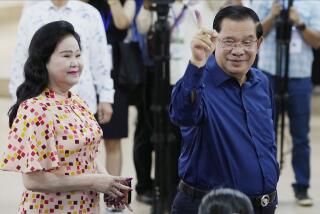Khmer Rouge Pair May Face Genocide Trial
- Share via
HANOI — Cambodian Prime Minister Hun Sen appeared to yield to international pressure Friday and in a surprise reversal said he supports trying two senior Khmer Rouge defectors for genocide.
The defectors, Khieu Samphan and Nuon Chea--part of a Maoist guerrilla movement responsible for the deaths of more than 1 million Cambodians from 1975 to 1979--had been given a red-carpet welcome after they in effect surrendered to the government last week and said they want to live as “ordinary Cambodians.”
Hun Sen, himself once a low-level Khmer Rouge commander, embraced the two well-dressed, aging guerrillas in Phnom Penh, the Cambodian capital, Tuesday and said they would be free to live out their lives without answering for the crimes.
But Friday, on national television, in an unexplained turnaround that caught diplomats by surprise, he implied that his support had never wavered for an international tribunal, such as those set up after Rwanda’s 1994 massacres and Bosnia-Herzegovina’s war. He had told the United Nations in 1997 and 1998 that he would support a trial.
“I am one among many people who support the investigation of the crimes of Pol Pot’s genocidal regime, which must be punished,” Hun Sen said in the broadcast, referring to the late Khmer Rouge leader.
“A court must be set up on the advice of national and international lawyers who are currently conducting this work,” he added.
The prime minister said preparations for a trial would proceed, but Khieu Samphan and Nuon Chea would remain free unless arrest warrants were issued. The two defectors had no immediate comment, and wire service reports from Phnom Penh said their whereabouts in Cambodia were unknown.
A three-member U.N. commission last year began looking into the possibility of setting up a tribunal and is due to present its report to Secretary-General Kofi Annan this month. Human rights groups and most Western countries, including the United States, have pushed for putting Khmer Rouge leaders on trial.
But Hun Sen had maintained, until Friday, that reconciliation is more important than retribution. During the last two years, he has managed to break the Khmer Rouge and end a 30-year civil war by coaxing guerrilla commanders and soldiers to the Phnom Penh side with promises of amnesty, money and government positions.
His strategy, however, apparently was derailed by criticism of the official welcome Khieu Samphan and Nuon Chea received and their casual remarks to “let bygones be bygones.” Only when repeatedly pressed by journalists did they apologize “not only for the lives of the people but also for the animals” killed during their ultra-communist experiment to “purify” Cambodia and turn it into an agrarian society.
Human rights groups were outraged, particularly when the government hosted the defectors Thursday at a seaside resort in Sihanoukville, and Khieu Samphan and Nuon Chea pleaded with journalists to leave them alone because they needed rest. Tens of thousands of Cambodians were worked to death during the Khmer Rouge’s 44-month reign of terror.
Pressure started to build on Hun Sen immediately. The U.S. Embassy in Phnom Penh issued a statement saying Cambodia’s handling of the Khmer Rouge issue would affect relations between the two countries. International donors--who had cut off assistance to Cambodia after a 1997 coup--signaled that letting the two men off scot-free could delay the resumption of aid.
Neighboring governments also were in a position to exert pressure because Cambodia is the only country in the region not included in the Assn. of Southeast Asian Nations, a nine-member group Hun Sen desperately wants to join to give his government legitimacy. The group last month agreed to admit Cambodia at some unspecified time in the future.
An aide to Khieu Samphan and Nuon Chea--both top Pol Pot lieutenants during the “Killing Fields” era--said a trial could be embarrassing to many countries, including the United States, China and Thailand.
“Implementing a trial would involve the 200 days and nights of bombing in Cambodia,” Long Narin said. “If they push for this [trial] we will dig up the past and present our own case.”
The United States’ carpet-bombing of Cambodia in the early 1970s upset the country’s supposed neutrality in the Vietnam War. Partly as a result, King Norodom Sihanouk was overthrown by an American-backed general, Lon Nol. He in turn was toppled by the China-backed Khmer Rouge in 1975.
More to Read
Sign up for Essential California
The most important California stories and recommendations in your inbox every morning.
You may occasionally receive promotional content from the Los Angeles Times.













